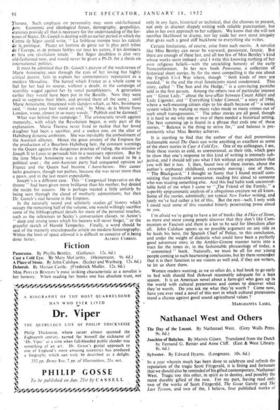Fiction
Panorama. By Phyllis Bentley. (Gollanc-z. 12s. 6d.)
Cast a Cold Eye. By Mary McCarthy. (Heinemann. 9s. 6d.)
MISS PHYLLIS BENTLEY'S most striking characteristic as a novelist is her honesty. When reading her books one has absolute trust, not
only in any facts, historical or technical, that she chooses to present, not only in discreet shapely writing with reliable punctuation, but also in her own approach to her subjects: We know that she will not sacrifice likelihood to drama, nor lay aside her own stout integrity . that gives such a good stiff backbone to everything she writes.
Certain limitatiorks, of course, arise from such merits. A novelist like Miss Bentley can never be wayward, passionate, fanatic. But there are enough of these last, and all too few of Miss Bentley's kind whose works seem imbued—and I Write this knowing nothing of her own religious beliefs—with the unyielding honesty of the early Nonconformists. In her new book Panorama, a collection of historical short stories, by far the most compelling is the one about
the English Civil War where, though both kinds of men are needed," in the end the rival fanaticisms stand condemned. This story, called " The Sun and the Hedge," is a convincing pastiche told in the first person. Among the others two of particular interest are " Great Lady," about the love-affair between Count Alfieri and Lady Ligonier, and " Everything Under Control," a story of 1946, where a well-meaning citizen slips to his death because of " a 'social system which by making so many rules made so many crimes out of such small transgressions." The other stories are all good, though it is hard to see why one or two of them needed a historical setting. The best summing up is found in a phrase that ends one of these stories, " Balance is the thing to strive for," and balance is pre- eminently what Miss Bentley achieves.
It is startling to find that the author of that dull pretentious fashionable novel The Oasis can write anything as excellent as some of the-short stories in Cast A Cold Eye. One of my colleagues, I see, finds these stories as cold, as unemotional, as their title, which goes to show that one's response to this kind of writing is intensely sub- jective, and I should tell you what I felt without any expectation that you will feel it too. I, then, found two of these ,stories, about the author's orphaned childhood, extremely moving ; one of them, " The Blackguard," I thought so funny that I found myself com- mitting that intolerable annoyance, reading bits aloud to someone who was reading something else. And this bad habit took uncontrol- lable hold of me when I came to ",The Friend of the Family," a superbly epigrammatic analysis of a ubiquitous creature we all know. Some of the stories, admittedly; are typical New Yorker writing, and lately we've had rather a lot of this. But the rest—well, I only wish I could read some of this rounded bitterly penetrating prose aloud to you.
l'm afraid we're going to have a lot of books like h,Place of Stone, as more and more young people discover that they don't like Com- munism or Fascism and there is a lot to be said for liberalism after all. John Culshaw spares us no possible argument on any side as he leads his hero, the Spanish Chief of Police, to this conclusion, and under the weight of dialectic what could have been a perfectly good -adventure story in the Ambler-Greene manner turns into a tract for the times or, in the fashionable phraseology of today, a " committed " book. Naturally, we must be all for our young people coming to such heartening conclusions, but let them remember that it is their function to see visions as well and, if they are writers, to let us share them.
Women readers wanting, as we so often do, a bad book to go early to bed with should find Deborah reasonably adequate for a lean season. It is an American novel about a farm-girl who goes up in the world with cultural pretensions and comes to discover what they're worth. Do you ask me what they're worth ? Come now, have you ever read a novel of this sort in which cultural pretensions stand a chance against good sound agricultural values ?
MARGIIANTTA L6SKI.


































 Previous page
Previous page